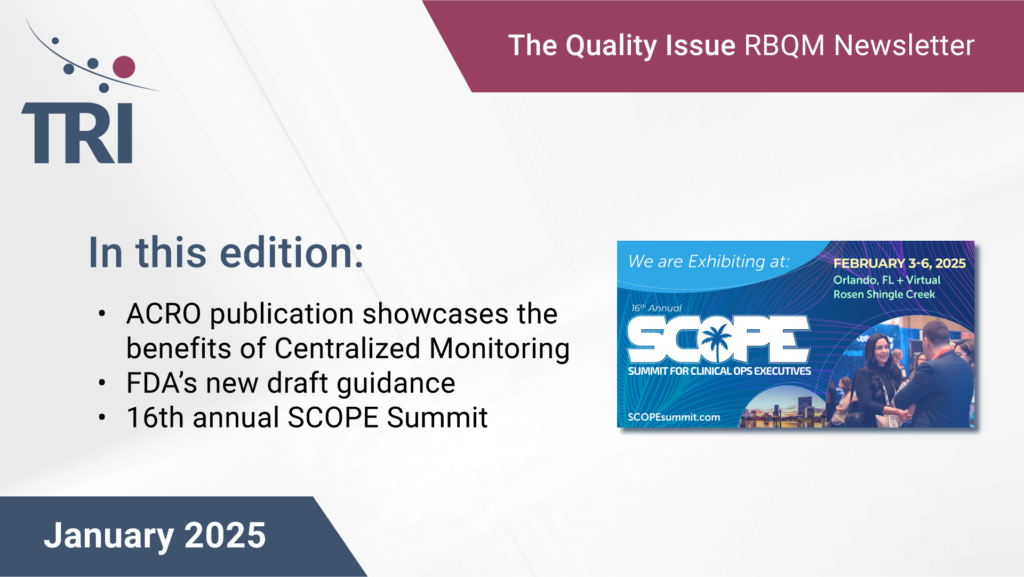The Quality Issue – January 2025

Happy New Year, and welcome to our first Quality Issue of 2025!
It this edition, we spotlight some of the most important developments in clinical research and Risk-Based Quality Management (RBQM). 2025 is going to be an interesting year for RBQM. Our prediction is that there’s going to be an increased focus on Central Monitoring to drive increased data quality, trial efficiency and effectiveness, and improve patient safety.
ACRO Releases Publication Showcasing Benefits of Centralized Monitoring Implementation Through Real-World Use Case
In December, ACRO’s RBQM Working Group announced the publication of its latest RBM/RBQM paper, Risk-Based Quality Management: A Case for Centralized Monitoring, in DIA’s Therapeutic Innovation & Regulatory Science journal.
In this new publication, ACRO’s RBQM Working Group provided a real-life example of centralized monitoring implementation using a clinical trial from clinicaltrials.gov.
“Centralized monitoring provides a holistic view of aggregate clinical trial data and earlier identification of emergent issues, enabling organizations to make data-driven decisions more quickly,” said Cris McDavid, Director, Risk-Based Quality Management, Parexel, and a member of ACRO’s RBQM Working Group.
By providing a tangible example of centralized monitoring implementation, the paper showcases the benefits of utilizing a risk-based approach to clinical trial monitoring, significantly reducing the need for 100% SDR/SDV.
The paper also highlights trends and takeaways on industry RBM/RBQM adoption from ACRO’s latest RBM/RBQM landscape survey. ACRO’s RBQM Working Group has worked in collaboration with the FDA to track the adoption of risk-based approaches in clinical trials over the past four years.
This paper and other resources from ACRO’s RBQM Working Group can be found on the ACRO website: https://www.acrohealth.org/risk-based-quality-management/
All ongoing clinical trials in the European Union must transition to the Clinical Trials Information System (CTIS) by January 31, 2025
This date marks the end of a three-year transition period that began when the Clinical Trials Regulation (CTR) became applicable in the EU.
Sponsors of clinical trials under the Clinical Trials Directive expected to continue after 30 January 2025 must consider the time required for Member States to complete the evaluation procedure, which can take up to three months. To help streamline the process, Member States will implement, where possible, an expedited procedure for transitioning trials to the CTR. Ongoing clinical trials do not need to be halted or ended during the transition from the previous legal regime, the Clinical Trials Directive, to the Clinical Trials Regulation.
For further information on how to transition your clinical trial, check out the available guidance and training materials
FDA's draft guidance on tissue biopsies in clinical trials
The FDA’s draft guidance on tissue biopsies in clinical trials, issued on January 6, 2025, provides several key recommendations that relate to risk management:
- Biopsies should only be required when necessary to answer critical questions in a clinical trial, such as determining eligibility or evaluating primary and key secondary endpoints.
- Optional biopsies are recommended for non-key secondary endpoints, exploratory endpoints, or unspecified future research to reduce participant burden and encourage trial participation.
- The risks and benefits of tissue biopsies should be carefully assessed, especially for tissue sites posing higher risks.
- Alternative approaches should be considered for high-risk tissue sites, and strong scientific justification is needed for their use.
- Informed consent is crucial, with clear communication on whether biopsies are required or optional, and detailed descriptions of physical and informational risks.
- For trials involving children, special considerations for risk and benefit assessment are emphasized, including parental permission and, when appropriate, child assent.
The draft guidance aims to enhance clinical trials by improving participant safety and furthering clinical research while ensuring that tissue biopsies are used judiciously and ethically in clinical trial protocols.
Dates for your diary
Join Isabel Villanueva, an RBQM Operations Consultant here at TRI, for our first webinar of 2025.
Isabel will be discussing the evolution of monitoring strategies, emphasizing the shift from on-site and SDV-based monitoring to risk-based approaches as outlined in ICH GCP E6 R3. We’ll also highlight the advantages of central statistical monitoring, such as efficiency and objective assessment, and the importance of understanding the root causes of issues. Finally, you will hear how central monitoring platforms facilitate setting up KRIs, identifying risks, and implementing mitigation actions, ensuring the success of clinical trials.
This is a free webinar, packed full of information in less than 30 minutes, suitable for and Sponsors and CROs involved in clinical trials. Register here
Connect with industry leaders, expand your network, and benefit from exclusive access to industry updates. Discover new opportunities in a seamless, interactive learning environment.
If you have any RBQM challenges or queries you’d like to discuss with the TRI team while you’re there, pop us a message and we’ll book a suitable time.
SCOPE is just around the corner, and one of the biggest events in the clinical trials calendar because of its comprehensive coverage of critical issues and innovations in the field. The summit brings industry leaders to share best practices and discuss the future of clinical trials.
This year is the 11th that the Clinical Quality and Risk Management stream has been run. It provides a great opportunity for clinical operations leaders to exchange best practices, case studies, and in-depth strategies for integrating a risk-based approach throughout the clinical research cycle and across functional areas.
This year, the program explores ways of leveraging RBQM technologies to achieve study plan goals, the impact of ICH E6 R3 on study conduct, usage of data science for a risk-based approach, and key insights for regulatory compliance.
Duncan Hall, CEO TRI is speaking at 09:25 on Thursday 7th. His presentation will focus on innovations in Central Monitoring that provide oversight for Sponsors and enable CROs to demonstrate their value-add. A key theme will be “When data is abundant, attention is scarce”. Duncan will show, with all the data available on clinical trials, where and how to get started quickly and easily.
Book a time to discuss all things RBQM with one of our experts. Email info@tritrials.com with your availability.
Visit TRI at booth #517.
Until next month! 😀
